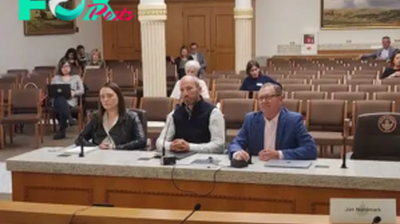Technology
Governor, lawmakers are already planning big revisions to Colorado’s first-in-the nation artificial intelligence law

Four weeks after a contentious Colorado bill regulating artificial intelligence systems to prevent harm to consumers was signed into law, the governor, attorney general and lawmakers are already vowing to revise the statute at the request of Business leaders.
Discussions about changing the law began earlier this month after state officials heard an outcry from about 200 prominent technology company executives and venture capitalists about Senate Bill 205.
The plan to take another look at the law isn’t entirely surprising. Polis had reservations about the bill, but signed it anyway because he said there was time to change it before it went into effect in 2026.
“I’m certainly encouraged by the fact that the beginning date for provisions are in 2026,” Gov. Jared Polis told reporters after the legislative session ended May 8. “I am confident that will leave ample time for any improvements that need to be made prior to it becoming effective.”
Changes to the law can’t be made by the legislature until the General Assembly reconvenes in January for the 2025 lawmaking term unless the governor or legislature calls a special session, which is highly unlikely.
☀️ READ MORE
Report finds Colorado was built on $1.7 trillion of land expropriated from tribal nations
Lauren Boebert’s big fundraising advantage over her Republican primary opponents is another sign of her dominance
Steamboat Springs multisport phenom is graduating with 15 varsity letters
In a letter Thursday to “innovators, consumers, and all those interested in the AI space,” Polis, Attorney General Phil Weiser and Senate Majority Leader Robert Rodriguez, D-Denver, acknowledged that the recently passed legislation needed “additional clarity” and “improvements.” Rodriguez was one of the main sponsors of the bill.
“Starting today, in the lead up to the 2025 legislative session and well before the February 2026 deadline for implementation of the law, at the governor and legislative leadership’s direction, state and legislative leaders will engage in a process to revise the new law, and minimize unintended consequences associated with its implementation,” the letter says.
The letter goes on to spell out what parts the law must be addressed, including defining what “high-risk systems” are and focusing regulation on developers of those high-risk systems and not the smaller companies that use third-party AI software. (If a company were using something like ChatGPT and its developer OpenAI made changes, there is confusion about whether Colorado law would require the local company to reassess its compliance.)
Other “improvements” the governor, attorney general and lawmakers are promising to make include requiring enforcement by the attorney general to happen after the fact instead of “proactive disclosure,” and clarifying that consumers have a right to appeal only to the attorney general, though they would also bring up any discrimination matters to the Colorado Civil Rights Commission.
Tech leaders complained about the prohibitive language of the new law and how it was already putting a black eye on Colorado for companies looking to expand in the state.
The letter from Polis, the attorney general and Rodriguez addressed that reality, saying that since the law was signed “many of our home-grown businesses have highlighted the risk that an overly broad definition of AI, coupled with proactive disclosure requirements, could inadvertently impose prohibitively high costs on them, resulting in barriers to growth and product development, job losses and a diminished capacity to raise capital.”

Dan Caruso, head of Caruso Ventures and founding CEO of telecom Zayo Group, was one of the names on the letter from Business leaders originally sent to Polis. Other notable names on the industry letter included Bryan Leach, CEO of the now publicly traded shopping app company Ibotta; forme DaVita CEO Kent Thiry; Brad Feld, a venture at The Foundry Group; and David Cohen, who cofounded and is now CEO of Techstars, which was cofounded by Feld and Polis.
“The intent is to fix the bill in the upcoming legislative session,” Leach told The Colorado Sun on Friday.
Rodriguez, who didn’t respond Friday to a request for comment. He said during a legislative hearing on the measure that “all that we’re asking for companies to do (is put) in a place a notice to consumers, (perform) risk assessments on their tools and have an accountability report when something goes wrong that results in discrimination, that’s what this bill does.”
But AI developers opposed the bill from the start because there were concerns that even small changes at the development stage would discourage innovation by startups and AI-adjacent companies. Consumer advocates, however, felt the bill did not go far enough because AI-based discrimination was already occurring, with cases involving background checks and resume screening, and adjustments to auto insurance premiums.
“There’s definitely a lot of misleading and reflexive industry opposition to the bill, but the arguments that they make are frankly rather galling given that industry played an outsized role in shaping this legislation, whereas labor and consumer groups were largely sidelined until the weeks and days immediately before the bill passed,” Matt Scherer, senior policy counsel for the Center for Democracy and Technology, a nonprofit that fights to advance civil rights and liberties in the digital age, said shortly after the bill was signed into law.
Eric Maruyama, a spokesman for the governor’s office said in an email that “Gov. Polis is proud that Colorado is leading the way in the innovative sectors of tomorrow.”
“The governor is grateful for and shares Sen. Rodriguez’s commitment to ensuring that Coloradans are protected from bias and discrimination in AI and is focused on ensuring that state standards support consumers and Colorado’s innovation economy,” Maruyama said. “Gov. Polis looks forward to working with leaders and stakeholders to help grow Colorado’s AI sector.”
Colorado Sun staff writer Jesse Paul contributed to this report.
-

 Technology1h ago
Technology1h agoApple offers fix after iPhone users report missing iCloud notes | The Express Tribune
-

 Technology17h ago
Technology17h agoBluesky’s rise: why users are migrating from X? | The Express Tribune
-

 Technology1d ago
Technology1d agoNorth Pole shift towards Russia alarms scientists, potentially disrupting smartphone accuracy | The Express Tribune
-

 Technology1d ago
Technology1d agoMajor brands return to X after one-year gap | The Express Tribune
-

 Technology1d ago
Technology1d agoChina tests building Moon base with lunar soil bricks | The Express Tribune
-

 Technology2d ago
Technology2d agoGet chronic UTIs? Future treatments may add more bacteria to your bladder to beat back harmful microbes
-

 Technology2d ago
Technology2d ago2024’s final supermoon visible tonight in Pakistan | The Express Tribune
-

 Technology3d ago
Technology3d agoEU fines Meta €798 million for Facebook Marketplace's 'abusive practices' | The Express Tribune



























